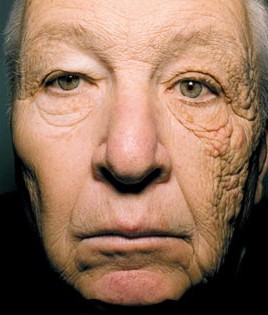Skin cancer is a real threat but most people go about life unaware of the sun’s harmful rays.
 Thousands of people read the MSN article last month about a 69 year old truck driver who suffered extreme damage to the left side of his face because of daily unprotected exposure to the sun. What could have prevented this? The answer is simple; wear sunscreen and a hat. He didn’t do anything extreme to get the damage you see in this image, he simply drove a truck for 28 years with the sun constantly beating on the one side of his face while not wearing any form of sunscreen or protection.
Thousands of people read the MSN article last month about a 69 year old truck driver who suffered extreme damage to the left side of his face because of daily unprotected exposure to the sun. What could have prevented this? The answer is simple; wear sunscreen and a hat. He didn’t do anything extreme to get the damage you see in this image, he simply drove a truck for 28 years with the sun constantly beating on the one side of his face while not wearing any form of sunscreen or protection.
The situation is so serious that skin cancer in America is being called “a growing epidemic.”
It has been estimated that Americans are spending almost $2 billion annually in medical costs to treat skin cancer, and that 1 in 5 Americans will get skin cancer during their lifetime.
Skin Cancer Statistics
- There are more than 3.5 million new cases of skin cancer diagnosed each year
- There are 2.2 million cases of skin cancer being treated each year
- Skin cancer is the most common cancer in the United States
- More people were diagnosed with skin cancer in 2009 than with breast cancer, prostate cancer, lung cancer, and colon cancer combined
The most staggering statistic released by the National Council on Skin Cancer Prevention is that “One American dies of melanoma almost every hour.”
Skin Cancer Prevention Tips
- Do not burn or tan (this includes so-called “safe” tanning beds, which aren’t safe at all)
- Seek shade between the hours of 10 am and 4 pm
- Wear protective clothing
- Apply sunscreen generously and often
- Take Vitamin D
Skin Cancer Treatment Options
There are numerous skin cancer treatment options available depending on the type and location of the tumor, and how far the cancer has spread. If you suspect you have skin cancer, see your doctor or dermatologist immediately.
DCA (sodium dichloroacetate) is an effective tool to fight skin cancer and is recommended as a follow-up treatment for patients who have or had skin cancer.

Comments are closed.